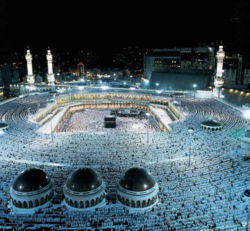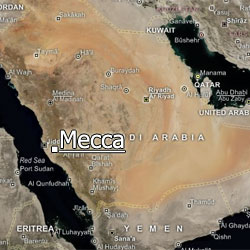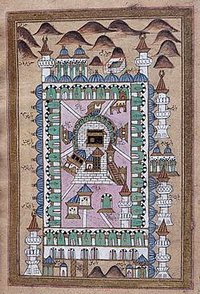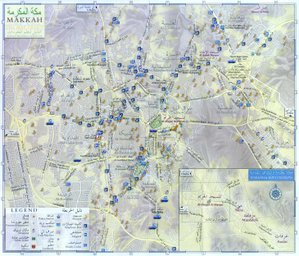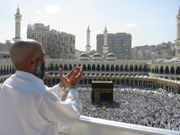Mecca
2007 Schools Wikipedia Selection. Related subjects: Religious movements, traditions and organizations
| Mecca Makkah al-Mukarramah مكة المكرمة |
|
| Location in the Kingdom of Saudi Arabia | |
| Coordinates: | |
|---|---|
| Province | Makkah |
| Prince | Abdulmajeed bin Abdul Aziz |
| Area | |
| - City | ? km² |
| - Land | ? km² |
| - Water | ? km² |
| Population | |
| - City (2004) | 1,294,168 |
Mecca IPA: [ˈmɛkə] or Makkah IPA: [ˈmækə] (in full: Makkah al-Mukarramah IPA: [(Arabic) mækːæ(t) ælmʊkarˑamæ]; Arabic: مكة المكرمة, Turkish: Mekke) is the capital city of Saudi Arabia's Makkah province, in the historic Hejaz region. It has a population of 1,294,167 (2004 census). The city is located 73 kilometres (45 mi) inland from Jeddah, in the narrow sandy Valley of Abraham, 277 metres (909 ft) above sea level. It is located 80 kilometres (50 mi) from the Red Sea.
The city is revered as the holiest site of Islam, and a pilgrimage to it is required of all able-bodied Muslims who can afford to go, at least once in their lifetime. Muslims regard the al-Masjid al-Haram (The Sacred Mosque) as the holiest place on Earth.
The term 'Mecca' has come into common usage metaphorically to mean any all-important site for any particular group of people, or a main attraction in a certain place or group of people that has a large turnout. In the 1980s the government of Saudi Arabia changed the official English transliteration of the city's name from 'Mecca', as it had been and continues to be commonly spelled by westerners, to 'Makkah'. See below for the reasons.
History
The Kaaba, a small cubical building now surrounded by the Sacred Mosque, is said by Muslims to have been built by Abraham and has been a religious centre ever since.
Soon before the time of Muhammad, Mecca fell under the control of the Banu Quraish, which, according to traditions, directly descends from Khaidar (Qedar), the second son of Ismail. Descendants of this tribe today refer to themselves as Qurayshis and are predominantly Muslim. Historians generally agree that Mecca was a shrine and trading centre for a number of generations before the Islamic prophet Muhammad. The extent of Meccan trade has been hotly debated. Some historians believe that Mecca was a waypoint on a land route from southern Arabia north to the Roman and Byzantine empires, and that Arabian and Indian Ocean spices were funneled through Mecca.
According to the Qur'ān, the city was attacked by an Ethiopian Aksumite army lead by Abraha in 570, the year of Muhammad's birth. The attack was said to have been repelled by the dropping of stones by thousands of birds, followed by a plague. Muhammad, a member of the Banu Quraish exiled from the city for preaching against paganism, returned to the city in triumph in 630 CE and after removing the cult images from the Kaaba, dedicated it as the centre of Muslim pilgrimage. (For further information, see the main article, Conquest of Mecca.)
After the rise of the Islamic empire, Mecca attracted pilgrims from all over the extensive empire, as well as a year-round population of scholars, pious Muslims who wished to live close to the Kaaba, and local inhabitants who served the pilgrims. Due to the difficulty and expense of the Hajj, the annual pilgrimage was small compared to the millions that swell Mecca today. The city too was small. 18th and 19th century maps and pictures show a small walled city of mud-brick houses crowded around the mosque.
Mecca was never the capital of the Islamic empire; the first capital was Medina, some 250 miles (400 km) away. The capital of the caliphate soon moved to Damascus and then Baghdad. Mecca re-entered Islamic history briefly when it was held by Abd-Allah ibn al-Zubayr, an early Muslim who opposed the Umayyad caliphs. The caliph Yazid I besieged Mecca in 683 CE. Thereafter the city figured little in politics; it was a city of devotion and scholarship. For centuries it was governed by the Hashemite Sharifs of Mecca, descendants of Muhammad by his grandson Hassan ibn Ali. The Sharifs ruled on behalf of whatever caliph or Muslim ruler had declared himself the Guardian of the Two Shrines. Mecca was attacked and sacked by Ismaili Muslims in 930 CE and by Wahhabi Muslims in 1803. In 1926, the Sharifs of Mecca were overthrown by the Saudis, and Mecca was incorporated into Saudi Arabia.
Current status
The city has grown substantially in the last several decades, as the convenience and affordability of jet travel has increased the number of pilgrims participating in the Hajj. Thousands of Saudis are employed year-round to oversee the Hajj and staff the hotels and shops that cater to pilgrims; these workers in turn have increased the demand for housing and services.
As the city expands, freeways, shopping malls, and skyscrapers have been built. The Salafi Islam that dominates Saudi Arabia views all veneration of shrines and graves as bid'a, shirk, and idolatry, and hence approves and encourages the demolition of such structures.
Importance
For Muslims, a pilgrimage to Mecca called the Hajj is required as one of the Five Pillars of the faith. In recent years, about two to three million have gathered for the major pilgrimage, during the Muslim month of Dhu al-Hijjah, and many more perform the minor pilgrimage or Umrah, which may be performed at any time of year.
The focal point of Mecca is the Ka'bah (or Kaaba). The "House of God" was believed to have been rebuilt by Abraham and his son Ishmael, it is covered in a gold-embroidered black fabric ( kiswah). The pilgrims circle the Ka'bah seven times and may also try to touch or kiss its cornerstone, the Hajar Aswad/ Black Stone. Pilgrims then drink from the well of Zamzam. Muslims believe that the water of Zamzam possess special properties and health benefits. Few pilgrims return from the Hajj without a large plastic bottle of the Zamzam water.
During the Hajj the pilgrims travel to Mina, a small village, where Iblis (the Devil), symbolised by stone columns, is ritually stoned. They then proceed to the Hill of Arafat, a site for prayers, where the prophet Muhammad delivered The Farewell Sermon.
The importance of Mecca for Muslims is inestimable. All Muslims, wherever they are on the earth, are required to pray five times a day in the direction of the Ka'bah in Mecca (located at ). This direction of prayer is known as the qiblah. Muslims regard al-Masjid al-Haram (or 'The Sacred Mosque') as the holiest place on Earth.
Non-Muslims and Mecca
Non-Muslims are not permitted to enter Mecca. Road blocks are stationed along roads leading to the city. As one might expect, the existence of "forbidden cities" and the mystery of the Hajj aroused intense curiosity in European travellers. A number of them pretended to be Muslims and entered the city of Mecca and then the Kaaba to experience the Hajj for themselves. The most famous account of a foreigner's journey to Mecca is A Personal Narrative of a Pilgrimage to Mecca and Al-Madina, written by Sir Richard Francis Burton. Burton traveled as a Qadiri Sufi from Afghanistan; his name, as he signed it in Arabic below his frontpiece portrait for "The Jew, The Gypsy and al-Islam," was al-Hajj 'Abdullah.
Spelling
Mecca has long been the accepted English spelling for the holy city as a transliteration of the original Arabic. The word has become part of the English language as a metaphor for a site of pilgrimage for people with a particular interest. In an effort to distinguish between the metaphorical and official references to the holy site, the Saudi Arabian government in the 1980s began promoting a new transliteration, Makkah al-Mukarramah, meaning Mecca the Blessed, which is closer to the original Arabic. This new usage has been adopted in many places and by certain organizations, such as the U.S. Department of State, but is not part of the active vocabulary of English-speakers at large. Some leading media organizations such as Reuters, the BBC and New York Times continue to use Mecca.
Pictures
|
Mecca from the air |
The Masjid al-Haram in Mecca |
Building in Mecca |
Mecca during the Hajj |
|
A street in Mecca during the Hajj |
Entrance to Mecca |
Inside the mosque |
Inside the mosque |
